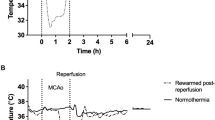Abstract
Mild hypothermia prevents the development of brain edema in rats with acute liver failure resulting from hepatic devascularization. Mechanistic studies performed in this model suggest that the protective effect of hypothermia results from the inhibition of blood-brain transfer of ammonia, an action which could result (at least in part) from an effect on cerebral blood flow. Hypothermia-induced reductions of brain ammonia are associated with normalization of extracellular brain glutamate concentrations in rats with acute liver failure. Studies in humans suggest that mild hypothermia is beneficial in the management of severely raised intracranial pressure, both before and after liver transplantation in patients with acute liver failure due to acetaminophen overdose. Mild hypothermia offers a potentially useful bridge therapy in patients with acute liver failure who are awaiting liver transplantation.
Similar content being viewed by others
Author information
Authors and Affiliations
Additional information
Received: July 7, 2000 / Accepted: October 12, 2000
About this article
Cite this article
Butterworth, R. Mild hypothermia prevents cerebral edema in acute liver failure. J Hep Bil Pancr Surg 8, 16–19 (2001). https://doi.org/10.1007/s005340170046
Issue Date:
DOI: https://doi.org/10.1007/s005340170046




